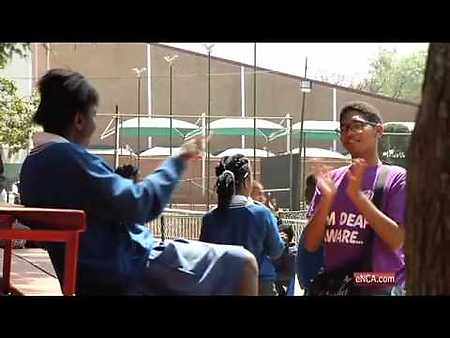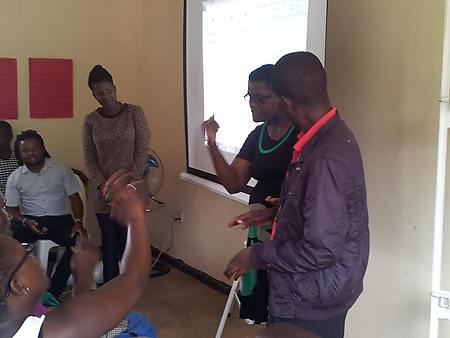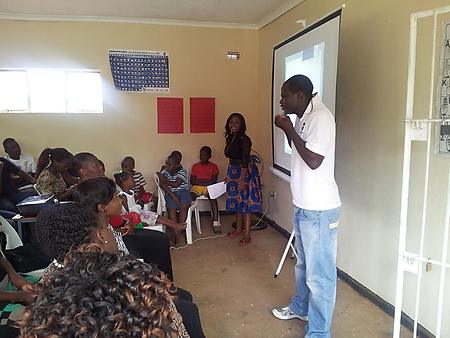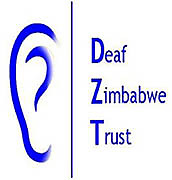Education11th June 2015
Signing School Opened to Improve Outcomes Through Oral Approach
Parents and supporters take action to ensure their deaf children access education that has been designed with deaf children in mind

When the policy on mainstreaming deaf students and forcing oralism rather than bilingualism, consistently churns out deaf children who have not reached their full educational potential, what do you do. Well in the UK and other countries around the world, the so-called ‘experts on deaf education,’ the policy makers, the politicians and everyone else with a ‘voice’ on the subject, do nothing at all. The status quo remains.
The people concerned in this process still get paid, and most sleep well at night, uncorked by the consequences because none of these people go on to lead the lives of the children/adults who are subject of their decision making. Poor outcomes in the exams are often attributed to learning difficulties, lack of focus or concentration, or being easily distracted - it is always the child’s fault!
 Whilst there are examples of some deaf children succeeding and doing very well through this teaching process, many do not. A subject of huge frustration for me, someone who experienced this process, I must confess to being delighted that some people are making a stand against this ‘oralism is the only route’ viewpoint.
Whilst there are examples of some deaf children succeeding and doing very well through this teaching process, many do not. A subject of huge frustration for me, someone who experienced this process, I must confess to being delighted that some people are making a stand against this ‘oralism is the only route’ viewpoint.
In this third article of our week-long focus on deaf education, I have been chatting to people from the Deaf Zimbabwe Trust, because after years of frustration, they have decided there is a different way, and children are already benefitting from their approach.
 In 2014, the Deaf Zimbabwe Trust opened a new school for deaf children. Situated in Greendale, a suburb of the capital city of Harare, the idea to open a new school to meet the education and childhood development needs of deaf children came from their parents. Tired of fighting a system that only promoted oralism, these parents wanted better life opportunities for their children, recognising that education and early years social development often determine much of our life path through adulthood. Coming together with a common goal, they started to develop a new school.
In 2014, the Deaf Zimbabwe Trust opened a new school for deaf children. Situated in Greendale, a suburb of the capital city of Harare, the idea to open a new school to meet the education and childhood development needs of deaf children came from their parents. Tired of fighting a system that only promoted oralism, these parents wanted better life opportunities for their children, recognising that education and early years social development often determine much of our life path through adulthood. Coming together with a common goal, they started to develop a new school.
Still at the early stages, the school now has 9 students who are of primary age, and 8 students in their high school. Seeking to make good on past teaching failures, the school also offer a back to school programme, so their students range in age from 4 to 23.
The school is run by five members of staff, three of whom are deaf, two hearing and they also have an interpreter.
 So, the big question. Why do the people involved in this project believe is it important for Deaf children to have access to signed teaching? “Oralism has not worked in Zimbabwe and the poor educational outcomes of the Deaf show that oralism has not worked in educational settings,” a member of the Deaf Zimbabwe Trust told me. “Signed teaching helps Deaf children get access to content in a language they understand. At Deaf Zimbabwe Trust our students have access to signed teaching; this has enhanced understanding of complex concepts and has enabled them to increase their vocabulary.”
So, the big question. Why do the people involved in this project believe is it important for Deaf children to have access to signed teaching? “Oralism has not worked in Zimbabwe and the poor educational outcomes of the Deaf show that oralism has not worked in educational settings,” a member of the Deaf Zimbabwe Trust told me. “Signed teaching helps Deaf children get access to content in a language they understand. At Deaf Zimbabwe Trust our students have access to signed teaching; this has enhanced understanding of complex concepts and has enabled them to increase their vocabulary.”
Faced with identical opinions about the use of sign language at all in schools, it is almost non-existent in other Government schools, leaving oralism the only option to parents of deaf children. Since the start of this programme to offer an alternative, those involved in supporting the availability of sign language have faced resistance, but energy and a determination to continue has come from parents of deaf children who support the provision of choice. “Whilst parents have welcomed the alternative, we have not seen much support from the Government,” I was told.
 With limited expectations because the school only opened its doors to students in 2014, I asked what the benefits were to their deaf students. “The benefits have been immense,” I was told enthusiastically. “We have witnessed a number of positive improvements in Deaf students. Their ability to access content in the classroom has improved. This has in turn resulted in improved self-confidence. In previous schools where they were forced to speak, they felt inferior as a result of the measurement that you need to speak for you to be a human being. This dehumanised them and as a result most students had signs of depression and low self-worth and value. The school is an accepting place that allows students to be themselves, to communicate in a way they understand.”
With limited expectations because the school only opened its doors to students in 2014, I asked what the benefits were to their deaf students. “The benefits have been immense,” I was told enthusiastically. “We have witnessed a number of positive improvements in Deaf students. Their ability to access content in the classroom has improved. This has in turn resulted in improved self-confidence. In previous schools where they were forced to speak, they felt inferior as a result of the measurement that you need to speak for you to be a human being. This dehumanised them and as a result most students had signs of depression and low self-worth and value. The school is an accepting place that allows students to be themselves, to communicate in a way they understand.”
Underpinned by a strong ethos to provide equality for the Deaf through provision of quality education, student numbers are continuing to rise, with parents of Deaf children seeking to enrol them following a positive experiences by other parents. So why is this school important to deaf children? Here are some quotes from staff involved.
 “The school is important for Deaf students because they learn all things in sign language. There is peer to peer interaction through groups and this has helped students to help each other and learn more.”
“The school is important for Deaf students because they learn all things in sign language. There is peer to peer interaction through groups and this has helped students to help each other and learn more.”
“In other schools the teachers did not make any follow up and this school cares about the school work. In the last school there was more focus on sawing, and wood work and they did not care about the outcomes, but here they care about the student and make follow ups. Now they also pass academic subjects such as maths, commerce and English. The environment is rich in sign language and this makes it a good place for Deaf children. Deaf Zimbabwe Trust School also uses visuals and ICT to ensure that students have access to educational content. The use of sign language in class has resulted in improved reading and writing. DZT first research on the problems faced by deaf children and then they make interventions based on research. Students are happy to be in a place where they are valued and treated with respect and dignity.”
 So teachers involved and the parents of deaf children think this is a good option, but what about the children, what makes them want to learn there? “The issue of the use of sign language takes the trophy as students feel that here they are accepted and still allowed to bring their potential in a friendly environment. In the past when they had challenges with their school work the teachers in other school would tell them to go away and they had a bad attitude toward Deaf students.”
So teachers involved and the parents of deaf children think this is a good option, but what about the children, what makes them want to learn there? “The issue of the use of sign language takes the trophy as students feel that here they are accepted and still allowed to bring their potential in a friendly environment. In the past when they had challenges with their school work the teachers in other school would tell them to go away and they had a bad attitude toward Deaf students.”
“The teachers at DZT School are patient and we have an interpreter and they are also able to ask questions until they understand. People at DZT are taught life skills and how to be responsible members of society. This has helped in raising self-esteem. Deaf children are able to seek counselling with teachers. The children are taught at a pace they understand. “
 Students at the Zimbabwe Deaf Trust School are taught the same curriculum as other schools, but at this school the staff ensure that the language used is appropriate so that lessons are understood by the students. They have also advocated for language accommodation with the local examination body as this will level the assessment terrain for Deaf children.
Students at the Zimbabwe Deaf Trust School are taught the same curriculum as other schools, but at this school the staff ensure that the language used is appropriate so that lessons are understood by the students. They have also advocated for language accommodation with the local examination body as this will level the assessment terrain for Deaf children.
Governed by a Board of Directors, the school is funded by donations and a small fee paid by the parents, but with aims to expand, they hope more and more people and organisations with support their endeavours financially.
Ultimately, the Deaf Zimbabwe Trust want to have programmes available for Deaf children to be given a second chance, if their mainstreamed oral education has let them down. Through their educational successes they also hope to develop a larger body of qualified Deaf teachers who can further increase the availability of signed teaching.
 It is still too early to get carried away by the early positive signs for the students already enrolled at the school, but having seen systemic failures in mainstream education over many years to people involved have no doubt the school will improve life opportunities. “Deaf students at our school have better future opportunities as we adopt a twin track approach that provides advocacy and service to our students,” they explained. “We research and advocate for better conditions for the Deaf, the implementation of constitutional provision and legal reform to ensure that the lives of the Deaf are better in holistic ways.”
It is still too early to get carried away by the early positive signs for the students already enrolled at the school, but having seen systemic failures in mainstream education over many years to people involved have no doubt the school will improve life opportunities. “Deaf students at our school have better future opportunities as we adopt a twin track approach that provides advocacy and service to our students,” they explained. “We research and advocate for better conditions for the Deaf, the implementation of constitutional provision and legal reform to ensure that the lives of the Deaf are better in holistic ways.”
“Our students have the same options as hearing students and are able to determine the professional paths they would like to take, unlike in other schools, where deaf students are forced to vocational subjects such as wood work regardless of aptitude or interest.”
 Like me, the Trust believes that the tick box exercise achieved through mainstreaming deaf children for their education is simply not good enough. To be effective, much more needs to be done to support effective communication, the child’s social development, friendships, access to peer groups, access to deaf aware teachers and material that has been designed with deaf students in mind.
Like me, the Trust believes that the tick box exercise achieved through mainstreaming deaf children for their education is simply not good enough. To be effective, much more needs to be done to support effective communication, the child’s social development, friendships, access to peer groups, access to deaf aware teachers and material that has been designed with deaf students in mind.
At the Trust school, they are thinking deaf and making the adaptations that are needed, including the opportunity to learn through signed teaching. I have no doubt that their students will benefit from the brave and insightful decisions taken by the parents of the deaf children at the school and their supporters.
Article by Sarah Lawrence, Editor
posted in Community / Education
11th June 2015





